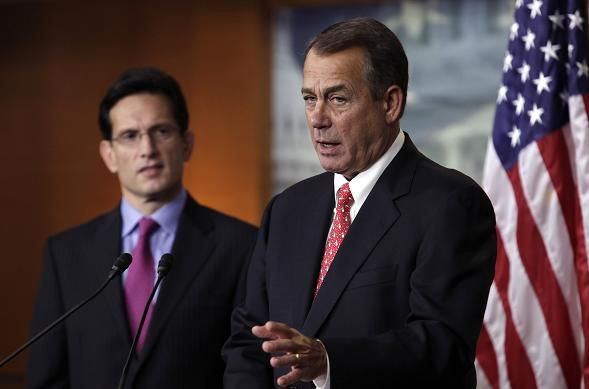Boehner: OK, ‘Plan B’ Failed, But Let’s Keep Working Toward A Deal

As uncertainly lingers about whether those at the top of each party can resolve the so-called fiscal cliff before the Dec. 31 deadline, House Speaker John Boehner said on Friday that he remains open to continuing discussions with the White House.
Boehner’s willingness to resume negotiations to avoid the automatic across-the-board tax increase and $500 billion in spending cuts that will go into effect in January if no deal is reached came after the Republican Party rejected his alternative to solving the fiscal cliff the previous night.
Boehner touted his “Plan B” earlier this week as a back-up plan in case discussions with President Barack Obama did not progress. Boehner's "Plan B" contained a tax break for those with an annual income of less than $1 million, but a hike for those making more than that figure.
The hope for “Plan B” was that it would protect as many taxpayers as possible from the double whammy of the fiscal cliff's spending cuts and tax hikes. With the plan, Boehner sought to shield what he said was 99 percent of Americans from a tax hike in 2013, while still working on a budget deal with Obama that was agreeable to both the Republican and Democratic Capitol Hill caucuses.
However, House Republicans rebuked "Plan B" Thursday night, as Boehner failed to convince them that the plan wasn’t a tax hike. Without enough to support to bring “Plan B” to a vote, Boehner yanked it. Boehner added that it was now up to Obama and Senate Majority Leader Harry Reid to devise a plan for preventing a possible recession and the higher unemployment that could follow if the nation goes over the cliff and negotiations remain at a stalemate into the first quarter of 2013.
“Republicans don't want taxes to go up,” Boehner said at a news conference Friday morning. “But we only run the House. Democrats continue to run Washington.”
So What’s Next?
“Nobody knows,” said William A. Galston, a senior fellow at the Brookings Institution.
Galston, who was a policy advisor to former President Bill Clinton, said that while Boehner has called on Obama and the Senate to act, there is nothing the two can do without the House.
And if Boehner can’t rally the support of his tea party-dominated House, then who can?
“It is far less likely they will consent to something the President and Harry Reid cooked up,” Galston said.
Right now, Galston suspects there is frantic discussion going on behind-the-scenes and that leaders will return next week, when they hope the sky will be blue.
Another former presidential advisor, Barry Bosworth said the failure is forcing Boehner to return to the drawing board and cut a deal with the White House.
“Now there is no guarantee that [Boehner] could hold up his end of any agreement,” Bosworth, a senior fellow at Brookings, said. “I don’t see the basis for negotiating with Boehner.”
Still, the grand bargain of tax increases in exchange for concessions on Social Security, and even more important Medicare and Medicaid, remains a potential-deal -- not a deal done.
With just a little over a week to go before the buzzer sounds, Galston still maintains it’s possible for the two polarized parties to hammer-out a deal.
White House Press Secretary Jay Carney Thursday said Obama’s priority concerning the fiscal cliff is to ensure 98 percent of Americans and 97 percent of small businesses don’t see a tax hike in the days ahead.
“The President will work with Congress to get this done and we are hopeful that we will be able to find a bipartisan solution quickly that protects the middle class and our economy,” Carney said, in a statement.
Alan Viard, a former senior economist at the Federal Reserve Bank of Dallas, said most expect there will be an agreement. What is unclear is what it will look like and when that will happen.
The resident scholar at American Enterprise Institute said the Internal Revenue Service will have to make a decision on income tax withholdings. The agency will need to decide to whether to require employers to deduct a higher income tax amount from paychecks or whether to allow employers to maintain current income tax withholding levels, which reflect the 2001/2003 Bush income tax cuts.
“That means employees could see a smaller paycheck in January,” Viard said. “It may magnify the economic impact if workers have less money to spend.”
And if that agreement is only in principle some experts expect an executive order from Obama could stay the sequestration until the language of the fiscal cliff agreement is sorted.
"I'm not sure what capability he has on the unemployment insurance," said Albert Cover, political science professor at Stony Brook University. "Those are who will fall off the cliff."
© Copyright IBTimes 2024. All rights reserved.






















